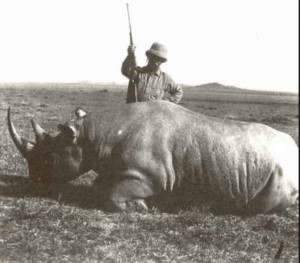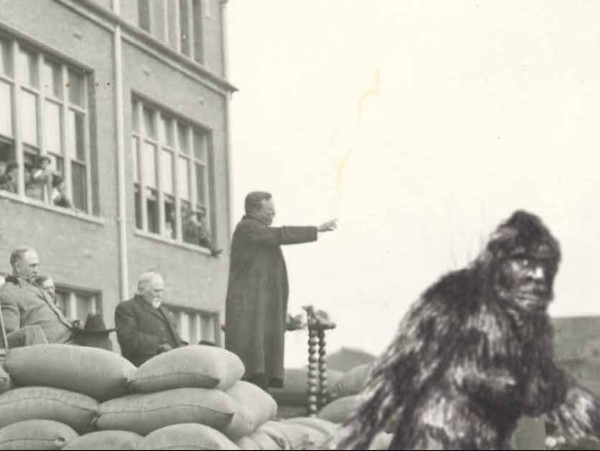 Let’s begin with everyone’s favorite conservationist, Teddy Roosevelt. Roosevelt loved the big animals of Africa. He especially liked to shoot them. (Hat tip: Peter Huber, Hard Green.) Somehow he is still a revered figure, unlike Thomas Jefferson and Andrew Jackson.
Let’s begin with everyone’s favorite conservationist, Teddy Roosevelt. Roosevelt loved the big animals of Africa. He especially liked to shoot them. (Hat tip: Peter Huber, Hard Green.) Somehow he is still a revered figure, unlike Thomas Jefferson and Andrew Jackson.
Well times change, you say. Lions, rhinos, elephants, and other African megafauna are rare and critically endangered. Anyone who would shoot one for sport is a moral monster on par with someone affixing a Confederate flag on their pickup truck. If anything this is an understatement of the reaction over Dr. Walter Palmer of Minnesota, who accidentally shot a celebrated lion on what was otherwise a legal hunt in Zimbabwe. He’s receiving the kind of death threats that would normally provoke a police investigation and the official designation by the Southern Poverty Law Center as “hate speech.”
I note, however, that this isn’t the first such big game hunting scandal. Back in 2011 the CEO of GoDaddy, Bob Parson, posted a video of himself shooting an elephant in Zimbabwe. (Here’s a YouTube link to a short ABC News report on that episode.) Although that kill also created an uproar, I don’t recall death threats.
May I suggest everyone calm down and ponder the inconvenient fact that Dr. Palmer’s paid hunting excursion contributes to the net saving of endangered animals in Africa? And that the predictable impulse—to ban all trophy hunting—that is sure to follow this ghastly mistake is likely to have the reverse effect, and speed up the extinction of rhinos and elephants?
Terry Anderson and Shawn Regan explained the matter at the time of the Parsons incident:
Anti-hunting groups succeeded in getting Kenya to ban all hunting in 1977. Since then, its population of large wild animals has declined between 60 and 70 percent. The country’s elephant population declined from 167,000 in 1973 to just 16,000 in 1989. Poaching took its toll on elephants because of their damage to both cropland and people. Today Kenya wildlife officials boast a doubling of the country’s elephant population to 32,000, but nearly all are in protected national parks where poaching can be controlled. With only 8 percent of its land set aside as protected areas, it is no wonder that wildlife in general and elephants in particular have trouble finding hospitable habitat.
For the landowners who bear the costs of wildlife, the decision of whether to protect wildlife is a simple one: if it pays, it stays. The ban on hunting gives wildlife little or no economic value, causing rural Africans to view wildlife as a liability to be avoided rather than an asset to be protected. As a result, landowners have increasingly turned to agriculture instead of habitat protection, which decreases available habitat and increases the potential for human-wildlife conflicts.
In sharp contrast to Kenya, consider what has happened in Zimbabwe. In 1989, results-oriented groups such as the World Wildlife Fund helped implement a program known as the Communal Areas Management Programme for Indigenous Resources or CAMPFIRE. This approach devolves the rights to benefit from, dispose of, and manage natural resources to the local level, including the right to allow safari hunting. Community leaders with local knowledge about wildlife and its interface with humans help establish sustainable hunting quotas. Hunting then provides jobs for community members, compensation for crop and property damage, revenue to build schools, clinics, and water wells, and meat for villagers—just as Parsons’ elephant did.
By granting local people control over wildlife resources, their incentive to protect it has strengthened. As a result, poaching has been contained and human-wildlife conflicts have been reduced. While challenges remain, especially from the current political climate in Zimbabwe, CAMPFIRE has quietly produced results with strikingly little activist rhetoric.
The numbers attest to the program’s success. Ten years after the program began, wildlife populations had increased by 50 percent. By 2003, elephant numbers had doubled from 4,000 to 8,000. The gains have not just been for wildlife, however. Between 1989 and 2001, CAMPFIRE generated more than $20 million in direct income, the vast majority of which came from hunting. During that period, the program benefitted an estimated 90,000 households and had a total economic impact of $100 million.
The results go beyond the CAMPFIRE areas. Between 1989 and 2005, Zimbabwe’s total elephant population more than doubled from 37,000 to 85,000, with half living outside of national parks. Today, some put the number as high as 100,000, even with trophy hunters such as Parsons around. All of this has occurred with an economy in shambles, regime uncertainty, and mounting socio-political challenges.
Throughout southern Africa, hunting and wildlife-related tourism have spurred private sector investment in wildlife conservation. The region is now home to more than 9,000 private game ranches, 1,100 privately managed nature reserves, and over 400 conservancies. In Namibia, which allows hunting, more than 80 percent of all large wild mammals live on private and community lands, and those populations have increased by 70 percent in recent years. In these regions where wildlife pays its way, habitat is conserved and wildlife populations thrive.
I don’t know if there are data for lion populations in Zimbabwe, but I wouldn’t be surprised to find that lion numbers have also increased. The tragic irony here is that if the animal lovers who want to mount Dr. Palmer’s head over their wood pellet stove get their way, they may well hasten the demise of the very creatures they say they want to save.
Meanwhile, here’s the time Teddy Roosevelt had a speech interrupted by Bigfoot. We’d have caught Bigfoot then if Teddy had had his hunting rifle with him.
PAUL ADDS: Groucho Marx once shot an elephant in his pajamas. How the elephant got into Groucho’s pajamas, he didn’t know.


Notice: All comments are subject to moderation. Our comments are intended to be a forum for civil discourse bearing on the subject under discussion. Commenters who stray beyond the bounds of civility or employ what we deem gratuitous vulgarity in a comment — including, but not limited to, “s***,” “f***,” “a*******,” or one of their many variants — will be banned without further notice in the sole discretion of the site moderator.